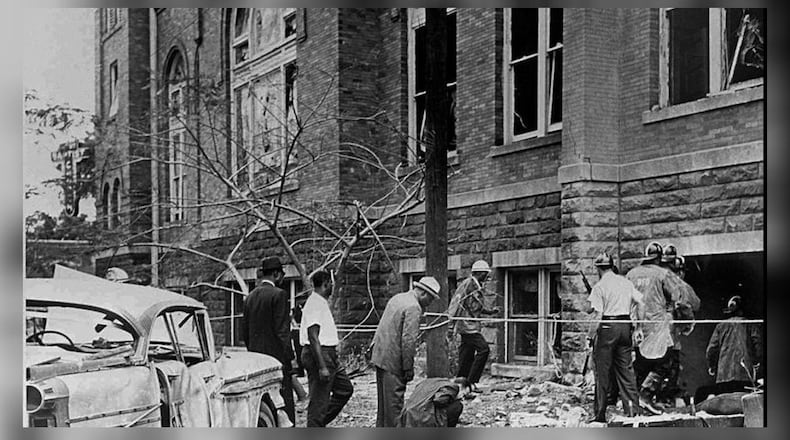At 10:22 a.m. on Sept. 15, 1963, going into what is known as the most segregated hour in the nation, Candi Staton sat in a Birmingham church with her young family.
As the pastor prepared to deliver the sermon, a deacon burst through the door, yelling for everyone to get out.
In another part of the city, dynamite planted by the Ku Klux Klan exploded in the basement of 16th Street Baptist Church, a prominent institution in the city and often the site of civil rights meetings. The blast killed four young girls — Denise McNair, Addie Mae Collins, Carole Robertson and Cynthia Wesley — and injured nearly two dozen more.
Around the world, people were shocked by their deaths.
It was yet another pivotal moment in the civil rights movement, and it sparked outrage and action
It happened eight years after the vicious murder of 14-year-old Emmet Till in neighboring Mississippi and just months after the Rev. Martin Luther King Jr. penned his “Letter from Birmingham Jail.”
Racial violence was nothing new in Alabama or Birmingham, which had become known as “Bombingham.”Alabama had produced the likes of Gov. George Wallace, a virulent segregationist, and Eugene “Bull” Conner, a white supremacist and commissioner of public safety in Birmingham.
“Just as the murder of Emmet Till fueled an existing civil rights movement, the death of the four little girls in Birmingham ignited another wave in the long struggle for freedom,” said Karcheik Sims-Alvarado, an assistant professor of Africana studies at Morehouse College and author of “Atlanta and the Civil Rights Movement, 1944-1968.”
Grassroots organizations throughout the South “joined forces with SCLC and SNCC and together, their mobilization efforts led to the passage of the Civil Rights Act of 1964 and the Voting Rights Act of 1965,” Sims-Alvarado said.
It also had a lasting effect on Staton, then a 23-year-old mom of two toddlers.
So much so that the singer, 83, who now lives in Madison, Ga., has penned and recorded a song “1963″ on Beracah Records in observance of the tragedy..
Credit: Mick Burgess
Credit: Mick Burgess
“When you go through something like that it never leaves your mind,” said Staton, who later went on to become a four-time Grammy nominee with hits such as “Young Hearts Run Free” and “Stand By Your Man.”
“It’s like a movie playing in your head. You can see everything. It was horrible.”
Staton, who lived in Warrior about 25 minutes away, and her family prayed as they fled in their car and sped home. One of her young sons cried on the floor in the back of the car and the other tried to crawl onto her lap as she drove.
Scores of people had taken to the streets. They were angry. They were afraid. Cars were overturned. Store windows were busted out.
“If you have children and any empathy or compassion at all, you knew the agony of what those mothers were going through,” she said. “I felt that pain. And, guess what? When I made that song, I cried all the way through.”
She made it a point to name each of the four girls in the song “to give them some honor. Civil rights really broke loose after that.”
Credit: Mick Burgess
Credit: Mick Burgess
Staton grew up in rural Hanceville, about 40 minutes outside of Birmingham where Jim Crow segregation was a way of life.
It was “”raw prejudice,” she said. When the family went to town, she would hear comments like “Uh-oh, a dark cloud is coming, it must be gonna rain.” Her mother would warn the children not to look white people in the eyes, to always hold their heads down.
Sometimes the Klan would come through the area with their hoods on.
As a teen, she was part of the Jewel Trio opening for actor-activist Paul Robeson during some of his political concerts. The group used to play in the yard of civil rights leader, Mary McLeod Bethune.
“We traveled in a caravan of cars,” said Staton, in a release about the song. “We did that because the police would stop anybody and harass them. If we were in a caravan, they had witnesses, so they were less likely to do something crazy.”
She doesn’t want people to forget what happened that day in Birmingham.
Neither does Lisa McNair who was born after her sister Denise perished in the 1963 bombing. Her sister would have turned 72 this November.
The family still has binders filled with telegrams and notes from people around the United States and as far away as Wales.
Her mother was at the church that day. Her father heard the blast from the church he attended, which was several miles away. “It was devastating.”
The horror of that day “left a lasting impression on the city of Birmingham,” said McNair, a public speaker and owner of a photography business. “It’s something Birmingham is known for, although the city has really done a good job of making things better.”
She and her relatives are asking houses of worship to ring their bells at 10:22 a.m. Friday and share with their congregations why they are honoring the lives of McNair, Collins, Robertson and Wesley.
About the Author
Keep Reading
The Latest
Featured






